Essay on Information Literacy, Research Methods for Nursing Students
VerifiedAdded on 2022/10/31
|6
|1410
|297
Essay
AI Summary
This academic essay delves into the critical importance of information literacy for nursing students, highlighting its role in decision-making, critical thinking, and evidence-based practice. It explores the significance of nurses being well-equipped with relevant information to handle complex healthcare issues. The essay discusses various methods of information gathering, including evidence-based practices, literature reviews, and consultations. It emphasizes the development of skills for applying evidence-based practices and using a common language for medical terms. Furthermore, the essay examines both qualitative and quantitative research methods used in nursing, detailing their applications, strengths, and weaknesses. It underscores the importance of combining these methods to enhance the reliability and validity of research findings and to address complex health disparities. The essay concludes by reiterating the importance of information literacy in equipping nursing students with the necessary skills and knowledge for nursing practice, including critical thinking and decision-making abilities, and highlights the role of research methods in supporting evidence-based practice.
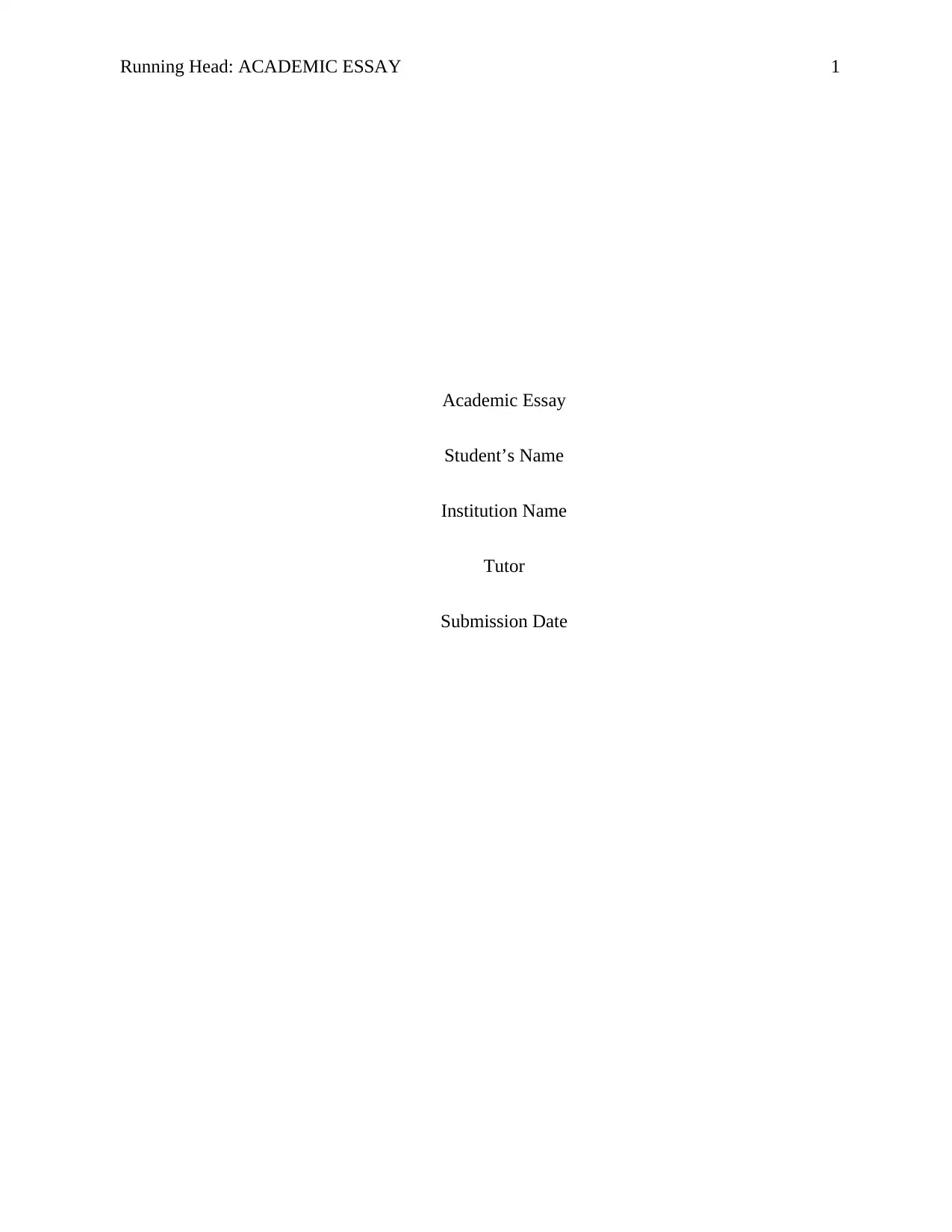
Running Head: ACADEMIC ESSAY 1
Academic Essay
Student’s Name
Institution Name
Tutor
Submission Date
Academic Essay
Student’s Name
Institution Name
Tutor
Submission Date
Paraphrase This Document
Need a fresh take? Get an instant paraphrase of this document with our AI Paraphraser
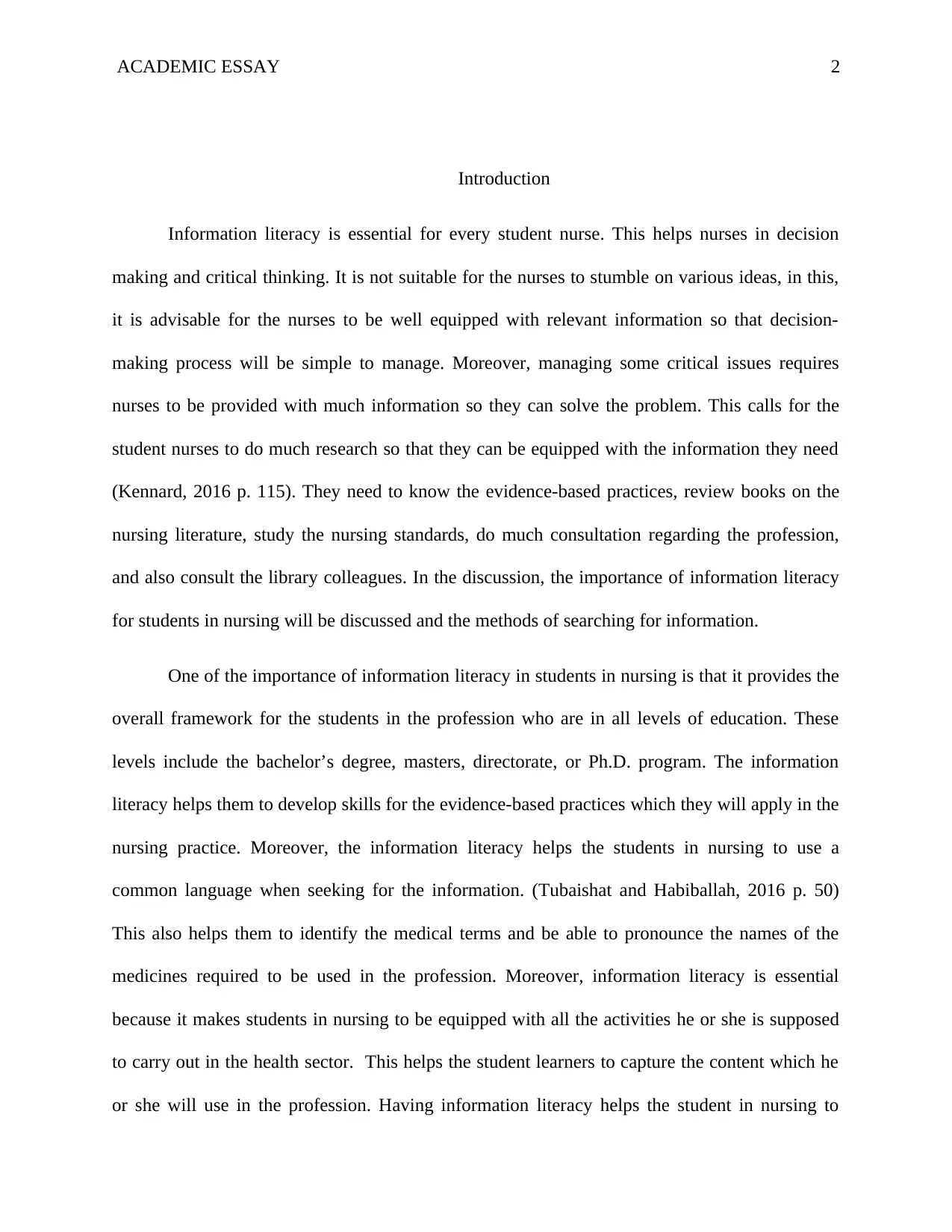
ACADEMIC ESSAY 2
Introduction
Information literacy is essential for every student nurse. This helps nurses in decision
making and critical thinking. It is not suitable for the nurses to stumble on various ideas, in this,
it is advisable for the nurses to be well equipped with relevant information so that decision-
making process will be simple to manage. Moreover, managing some critical issues requires
nurses to be provided with much information so they can solve the problem. This calls for the
student nurses to do much research so that they can be equipped with the information they need
(Kennard, 2016 p. 115). They need to know the evidence-based practices, review books on the
nursing literature, study the nursing standards, do much consultation regarding the profession,
and also consult the library colleagues. In the discussion, the importance of information literacy
for students in nursing will be discussed and the methods of searching for information.
One of the importance of information literacy in students in nursing is that it provides the
overall framework for the students in the profession who are in all levels of education. These
levels include the bachelor’s degree, masters, directorate, or Ph.D. program. The information
literacy helps them to develop skills for the evidence-based practices which they will apply in the
nursing practice. Moreover, the information literacy helps the students in nursing to use a
common language when seeking for the information. (Tubaishat and Habiballah, 2016 p. 50)
This also helps them to identify the medical terms and be able to pronounce the names of the
medicines required to be used in the profession. Moreover, information literacy is essential
because it makes students in nursing to be equipped with all the activities he or she is supposed
to carry out in the health sector. This helps the student learners to capture the content which he
or she will use in the profession. Having information literacy helps the student in nursing to
Introduction
Information literacy is essential for every student nurse. This helps nurses in decision
making and critical thinking. It is not suitable for the nurses to stumble on various ideas, in this,
it is advisable for the nurses to be well equipped with relevant information so that decision-
making process will be simple to manage. Moreover, managing some critical issues requires
nurses to be provided with much information so they can solve the problem. This calls for the
student nurses to do much research so that they can be equipped with the information they need
(Kennard, 2016 p. 115). They need to know the evidence-based practices, review books on the
nursing literature, study the nursing standards, do much consultation regarding the profession,
and also consult the library colleagues. In the discussion, the importance of information literacy
for students in nursing will be discussed and the methods of searching for information.
One of the importance of information literacy in students in nursing is that it provides the
overall framework for the students in the profession who are in all levels of education. These
levels include the bachelor’s degree, masters, directorate, or Ph.D. program. The information
literacy helps them to develop skills for the evidence-based practices which they will apply in the
nursing practice. Moreover, the information literacy helps the students in nursing to use a
common language when seeking for the information. (Tubaishat and Habiballah, 2016 p. 50)
This also helps them to identify the medical terms and be able to pronounce the names of the
medicines required to be used in the profession. Moreover, information literacy is essential
because it makes students in nursing to be equipped with all the activities he or she is supposed
to carry out in the health sector. This helps the student learners to capture the content which he
or she will use in the profession. Having information literacy helps the student in nursing to
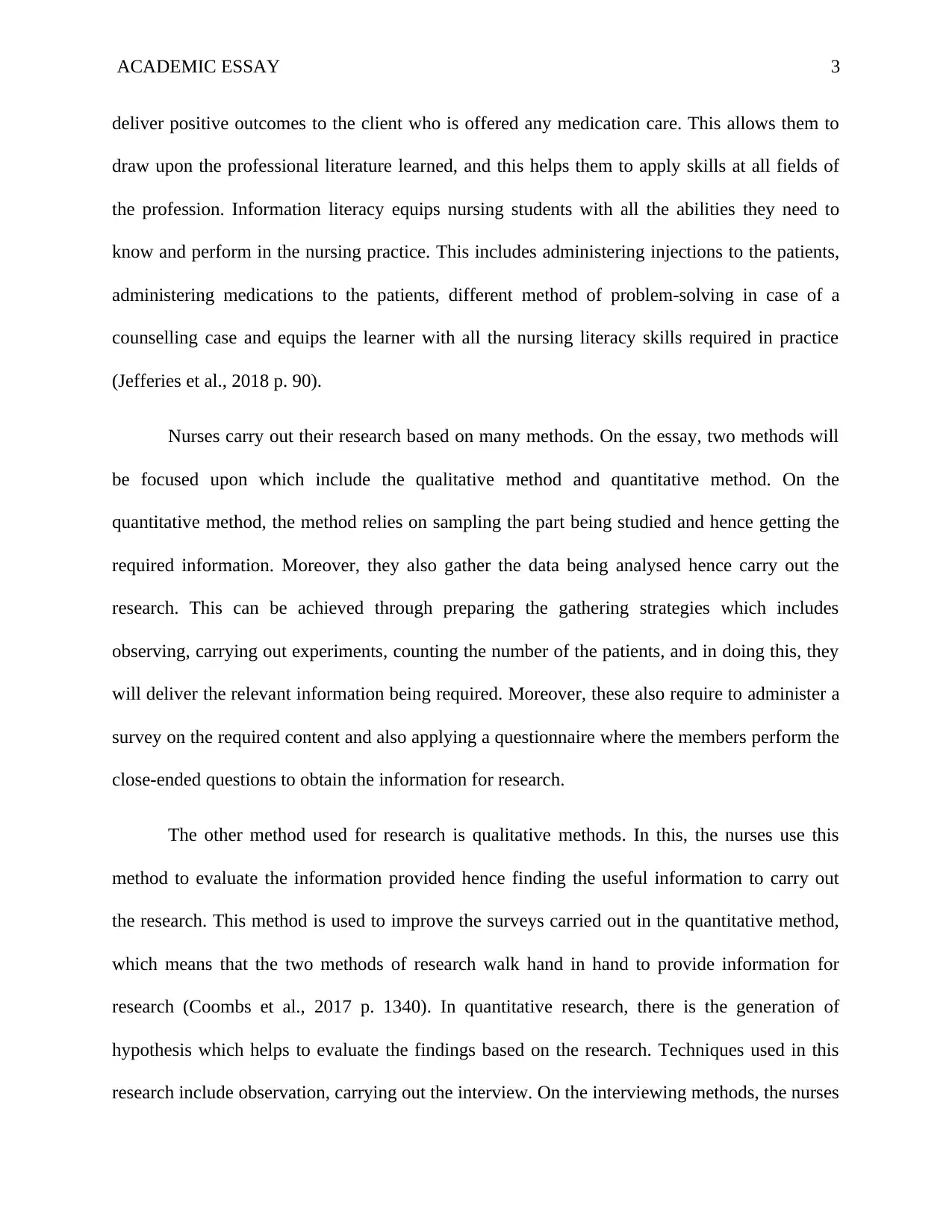
ACADEMIC ESSAY 3
deliver positive outcomes to the client who is offered any medication care. This allows them to
draw upon the professional literature learned, and this helps them to apply skills at all fields of
the profession. Information literacy equips nursing students with all the abilities they need to
know and perform in the nursing practice. This includes administering injections to the patients,
administering medications to the patients, different method of problem-solving in case of a
counselling case and equips the learner with all the nursing literacy skills required in practice
(Jefferies et al., 2018 p. 90).
Nurses carry out their research based on many methods. On the essay, two methods will
be focused upon which include the qualitative method and quantitative method. On the
quantitative method, the method relies on sampling the part being studied and hence getting the
required information. Moreover, they also gather the data being analysed hence carry out the
research. This can be achieved through preparing the gathering strategies which includes
observing, carrying out experiments, counting the number of the patients, and in doing this, they
will deliver the relevant information being required. Moreover, these also require to administer a
survey on the required content and also applying a questionnaire where the members perform the
close-ended questions to obtain the information for research.
The other method used for research is qualitative methods. In this, the nurses use this
method to evaluate the information provided hence finding the useful information to carry out
the research. This method is used to improve the surveys carried out in the quantitative method,
which means that the two methods of research walk hand in hand to provide information for
research (Coombs et al., 2017 p. 1340). In quantitative research, there is the generation of
hypothesis which helps to evaluate the findings based on the research. Techniques used in this
research include observation, carrying out the interview. On the interviewing methods, the nurses
deliver positive outcomes to the client who is offered any medication care. This allows them to
draw upon the professional literature learned, and this helps them to apply skills at all fields of
the profession. Information literacy equips nursing students with all the abilities they need to
know and perform in the nursing practice. This includes administering injections to the patients,
administering medications to the patients, different method of problem-solving in case of a
counselling case and equips the learner with all the nursing literacy skills required in practice
(Jefferies et al., 2018 p. 90).
Nurses carry out their research based on many methods. On the essay, two methods will
be focused upon which include the qualitative method and quantitative method. On the
quantitative method, the method relies on sampling the part being studied and hence getting the
required information. Moreover, they also gather the data being analysed hence carry out the
research. This can be achieved through preparing the gathering strategies which includes
observing, carrying out experiments, counting the number of the patients, and in doing this, they
will deliver the relevant information being required. Moreover, these also require to administer a
survey on the required content and also applying a questionnaire where the members perform the
close-ended questions to obtain the information for research.
The other method used for research is qualitative methods. In this, the nurses use this
method to evaluate the information provided hence finding the useful information to carry out
the research. This method is used to improve the surveys carried out in the quantitative method,
which means that the two methods of research walk hand in hand to provide information for
research (Coombs et al., 2017 p. 1340). In quantitative research, there is the generation of
hypothesis which helps to evaluate the findings based on the research. Techniques used in this
research include observation, carrying out the interview. On the interviewing methods, the nurses
⊘ This is a preview!⊘
Do you want full access?
Subscribe today to unlock all pages.

Trusted by 1+ million students worldwide
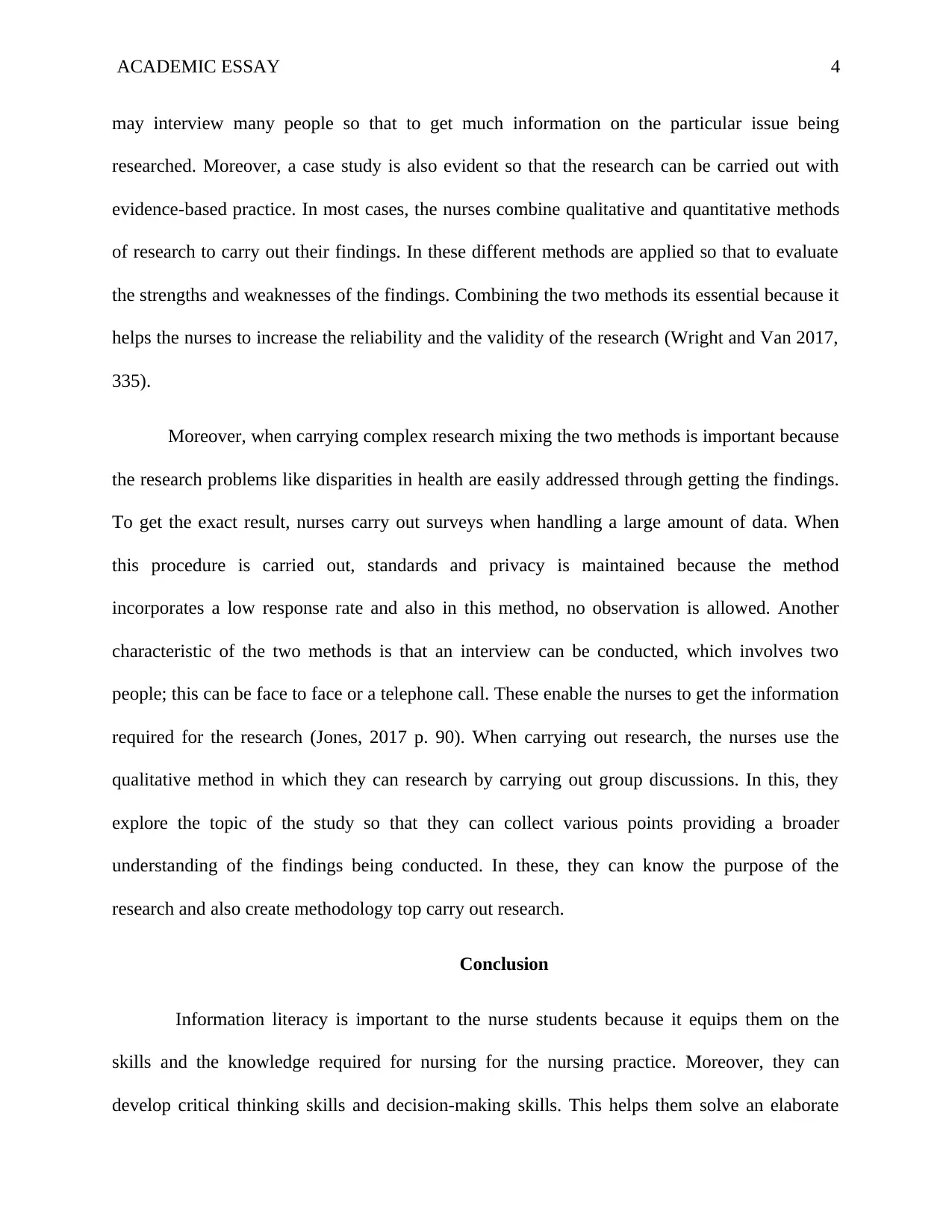
ACADEMIC ESSAY 4
may interview many people so that to get much information on the particular issue being
researched. Moreover, a case study is also evident so that the research can be carried out with
evidence-based practice. In most cases, the nurses combine qualitative and quantitative methods
of research to carry out their findings. In these different methods are applied so that to evaluate
the strengths and weaknesses of the findings. Combining the two methods its essential because it
helps the nurses to increase the reliability and the validity of the research (Wright and Van 2017,
335).
Moreover, when carrying complex research mixing the two methods is important because
the research problems like disparities in health are easily addressed through getting the findings.
To get the exact result, nurses carry out surveys when handling a large amount of data. When
this procedure is carried out, standards and privacy is maintained because the method
incorporates a low response rate and also in this method, no observation is allowed. Another
characteristic of the two methods is that an interview can be conducted, which involves two
people; this can be face to face or a telephone call. These enable the nurses to get the information
required for the research (Jones, 2017 p. 90). When carrying out research, the nurses use the
qualitative method in which they can research by carrying out group discussions. In this, they
explore the topic of the study so that they can collect various points providing a broader
understanding of the findings being conducted. In these, they can know the purpose of the
research and also create methodology top carry out research.
Conclusion
Information literacy is important to the nurse students because it equips them on the
skills and the knowledge required for nursing for the nursing practice. Moreover, they can
develop critical thinking skills and decision-making skills. This helps them solve an elaborate
may interview many people so that to get much information on the particular issue being
researched. Moreover, a case study is also evident so that the research can be carried out with
evidence-based practice. In most cases, the nurses combine qualitative and quantitative methods
of research to carry out their findings. In these different methods are applied so that to evaluate
the strengths and weaknesses of the findings. Combining the two methods its essential because it
helps the nurses to increase the reliability and the validity of the research (Wright and Van 2017,
335).
Moreover, when carrying complex research mixing the two methods is important because
the research problems like disparities in health are easily addressed through getting the findings.
To get the exact result, nurses carry out surveys when handling a large amount of data. When
this procedure is carried out, standards and privacy is maintained because the method
incorporates a low response rate and also in this method, no observation is allowed. Another
characteristic of the two methods is that an interview can be conducted, which involves two
people; this can be face to face or a telephone call. These enable the nurses to get the information
required for the research (Jones, 2017 p. 90). When carrying out research, the nurses use the
qualitative method in which they can research by carrying out group discussions. In this, they
explore the topic of the study so that they can collect various points providing a broader
understanding of the findings being conducted. In these, they can know the purpose of the
research and also create methodology top carry out research.
Conclusion
Information literacy is important to the nurse students because it equips them on the
skills and the knowledge required for nursing for the nursing practice. Moreover, they can
develop critical thinking skills and decision-making skills. This helps them solve an elaborate
Paraphrase This Document
Need a fresh take? Get an instant paraphrase of this document with our AI Paraphraser
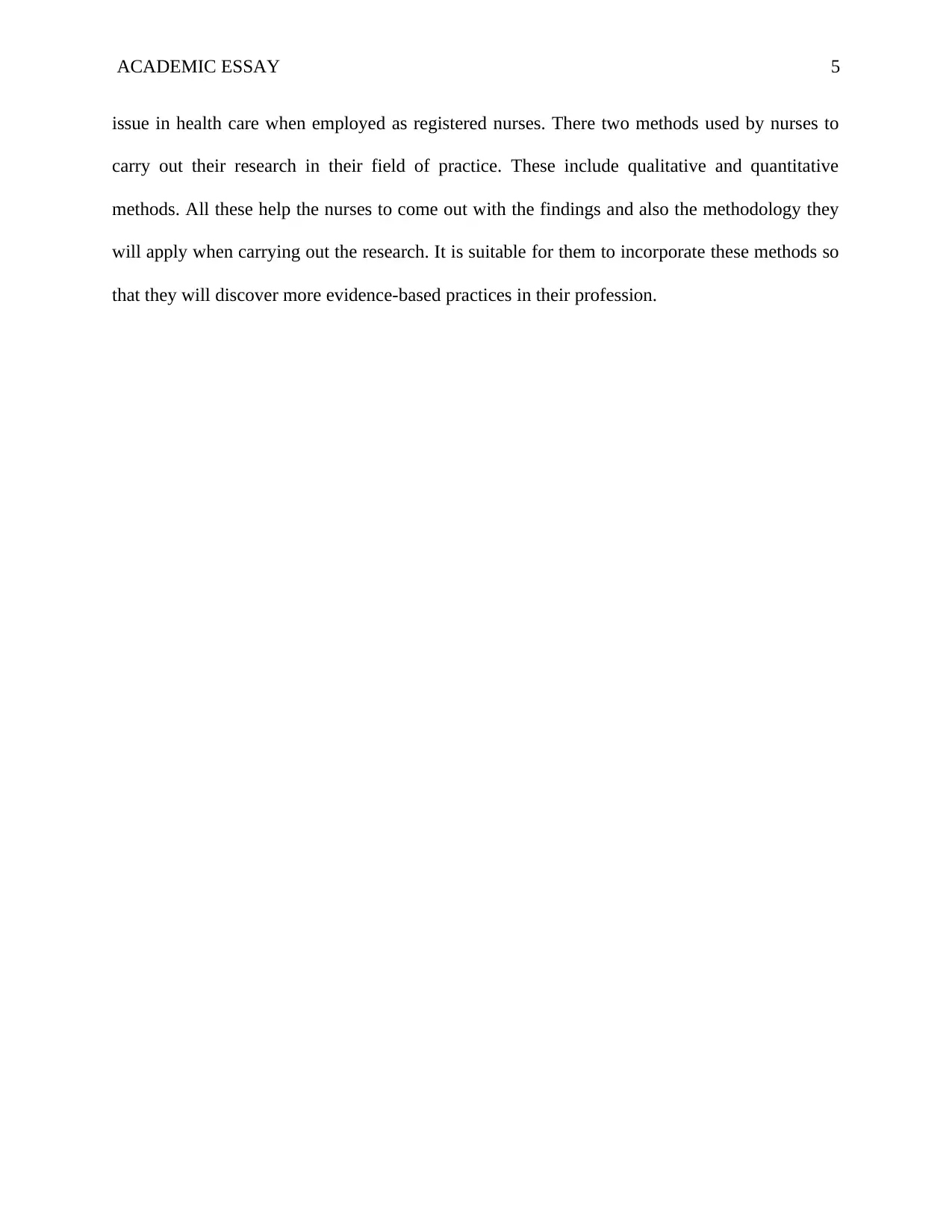
ACADEMIC ESSAY 5
issue in health care when employed as registered nurses. There two methods used by nurses to
carry out their research in their field of practice. These include qualitative and quantitative
methods. All these help the nurses to come out with the findings and also the methodology they
will apply when carrying out the research. It is suitable for them to incorporate these methods so
that they will discover more evidence-based practices in their profession.
issue in health care when employed as registered nurses. There two methods used by nurses to
carry out their research in their field of practice. These include qualitative and quantitative
methods. All these help the nurses to come out with the findings and also the methodology they
will apply when carrying out the research. It is suitable for them to incorporate these methods so
that they will discover more evidence-based practices in their profession.
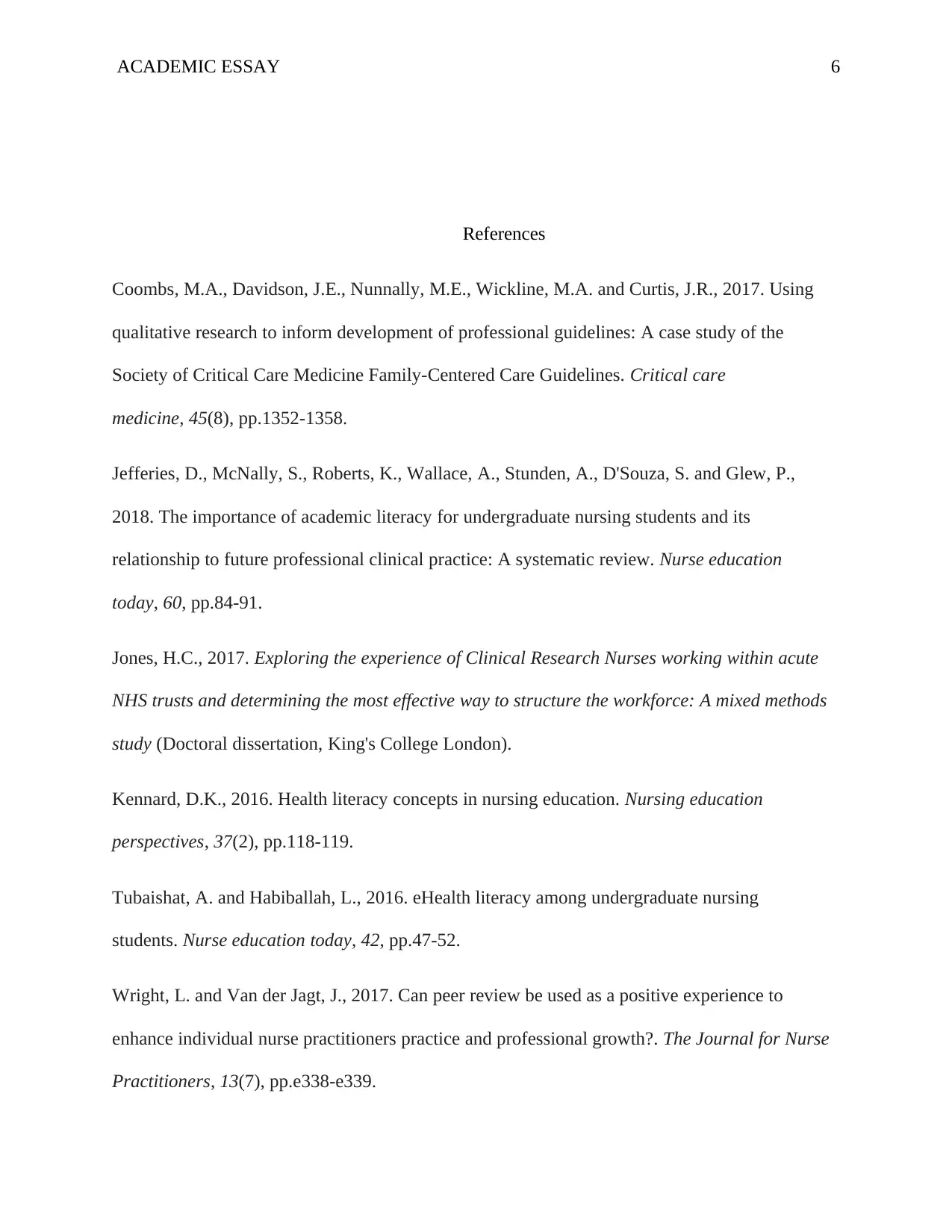
ACADEMIC ESSAY 6
References
Coombs, M.A., Davidson, J.E., Nunnally, M.E., Wickline, M.A. and Curtis, J.R., 2017. Using
qualitative research to inform development of professional guidelines: A case study of the
Society of Critical Care Medicine Family-Centered Care Guidelines. Critical care
medicine, 45(8), pp.1352-1358.
Jefferies, D., McNally, S., Roberts, K., Wallace, A., Stunden, A., D'Souza, S. and Glew, P.,
2018. The importance of academic literacy for undergraduate nursing students and its
relationship to future professional clinical practice: A systematic review. Nurse education
today, 60, pp.84-91.
Jones, H.C., 2017. Exploring the experience of Clinical Research Nurses working within acute
NHS trusts and determining the most effective way to structure the workforce: A mixed methods
study (Doctoral dissertation, King's College London).
Kennard, D.K., 2016. Health literacy concepts in nursing education. Nursing education
perspectives, 37(2), pp.118-119.
Tubaishat, A. and Habiballah, L., 2016. eHealth literacy among undergraduate nursing
students. Nurse education today, 42, pp.47-52.
Wright, L. and Van der Jagt, J., 2017. Can peer review be used as a positive experience to
enhance individual nurse practitioners practice and professional growth?. The Journal for Nurse
Practitioners, 13(7), pp.e338-e339.
References
Coombs, M.A., Davidson, J.E., Nunnally, M.E., Wickline, M.A. and Curtis, J.R., 2017. Using
qualitative research to inform development of professional guidelines: A case study of the
Society of Critical Care Medicine Family-Centered Care Guidelines. Critical care
medicine, 45(8), pp.1352-1358.
Jefferies, D., McNally, S., Roberts, K., Wallace, A., Stunden, A., D'Souza, S. and Glew, P.,
2018. The importance of academic literacy for undergraduate nursing students and its
relationship to future professional clinical practice: A systematic review. Nurse education
today, 60, pp.84-91.
Jones, H.C., 2017. Exploring the experience of Clinical Research Nurses working within acute
NHS trusts and determining the most effective way to structure the workforce: A mixed methods
study (Doctoral dissertation, King's College London).
Kennard, D.K., 2016. Health literacy concepts in nursing education. Nursing education
perspectives, 37(2), pp.118-119.
Tubaishat, A. and Habiballah, L., 2016. eHealth literacy among undergraduate nursing
students. Nurse education today, 42, pp.47-52.
Wright, L. and Van der Jagt, J., 2017. Can peer review be used as a positive experience to
enhance individual nurse practitioners practice and professional growth?. The Journal for Nurse
Practitioners, 13(7), pp.e338-e339.
⊘ This is a preview!⊘
Do you want full access?
Subscribe today to unlock all pages.

Trusted by 1+ million students worldwide
1 out of 6
Related Documents
Your All-in-One AI-Powered Toolkit for Academic Success.
+13062052269
info@desklib.com
Available 24*7 on WhatsApp / Email
![[object Object]](/_next/static/media/star-bottom.7253800d.svg)
Unlock your academic potential
Copyright © 2020–2026 A2Z Services. All Rights Reserved. Developed and managed by ZUCOL.




